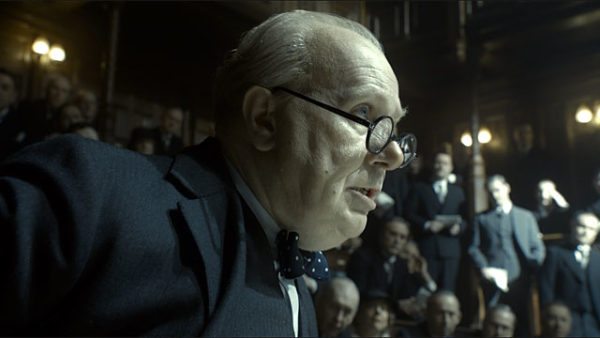Darkest Hour, 2017.
Directed by Joe Wright.
Starring Gary Oldman, Lily James, Kristin Scott Thomas, Stephen Dillane, Samuel West, Jordan Waller, Ronald Pickup, and Ben Mendelsohn.
SYNOPSIS:
During the early days of World War II, the fate of Western Europe hangs on the newly-appointed British Prime Minister Winston Churchill, who must decide whether to negotiate with Hitler, or fight on against incredible odds.
Before even beginning to praise the authentic and physically transformative Academy Award-worthy performance from legendary actor Gary Oldman portraying arguably the greatest politician in history, Prime Minister of Great Britain Winston Churchill, it should be made clear that the excellence doesn’t start and stop with the chameleon-like appearance or the numerous rousing speeches of defiance. Director Joe Wright (no stranger to period pieces and biopics having helmed features such as Atonement and Anna Karenina) understands that even the most lifelike depiction possible of the curmudgeonly yet bracingly energetic leader is all for naught if there is no character depth. Wisely, he also knows that for as influential and talented Winston Churchill was (he was also a world-famous author and painter, among many other accomplishments), it is impossible to achieve justice within representation that crams together a narrative spanning from birth to death.
There is a strong feeling of claustrophobia and panic ridden anxiety looming over Darkest Hour; technically the film is set over the course of roughly one month but much of the suspense takes place within a 2-3 window as Churchill not only struggles with the transition of being handed the keys to an equally struggling kingdom along with earning support from his rivals and Parliament alike, but Hitler closing in on Allied forces and staging the Dunkirk evacuation (something that more moviegoers than ever are now familiar with thanks to the riveting survival experience from Christopher Nolan). Whereas that blockbuster companion piece explored the intensity of the retreat firsthand, here we get the behind the scenes look at the process of getting those soldiers home, which unfortunately was not met with much assistance from America.
These segments also make it known that the filmmakers and Gary Oldman himself were also concerned with re-creating those war rooms with footage studied on how meetings might have taken place. Much like an audience clenching their fists into the auditorium seat watching these debates, Winston Churchill also does so as he searches for solutions with the clock ticking. He’s a man of sardonic humor and admirable resiliency to never give into Germany, so much so that whenever the proposition comes from his peers to negotiate with Hitler saving Britain some slaughter, he utterly refuses to entertain the idea. “There is no negotiating with someone who has their head stuck in their mouth”, he says, and it’s a true statement.
As the council persists and the situation becomes dire, Churchill actually does the unthinkable contemplates what the demands might be like, which renders the brilliant wordsmith speechless. Occasionally, he will stammer so much his sentences just slowly morph into incoherent rambling, expressing a deep vulnerability in the man. Furthermore, for as moving as Gary Oldman’s showing is in its entirety, it’s this sequence more so than the makeup (stunningly crafted by artist Kazuhiro Tsuji coming out of film retirement at Oldman’s request) or small speaking mannerisms that seal the deal as something extraordinary. The heavy dilemma weighs down on his shoulders with an insurmountable presence, one that is amplified in sympathy thanks to a number of well-rounded supporting characters ranging from his wife Clementine (Kristin Scott Thomas) or his typist Elizabeth (Lily James who is given slightly more material than expected). There’s also a meaningful conversation with King George Vi played by the underrated but always impressionable Ben Mendelsohn (Rogue One: A Star Wars Story).
Still, this is conventional period piece filmmaking that is out to tell the story and nothing more. This isn’t necessarily a bad thing (as mentioned the production design and aesthetics, whether they be era-appropriate suits, the signature brand of cigars Churchill loved to smoke, and more) considering it’s all executed with quality, but in the end the only thing that’s truly worth remembering is Gary Oldman’s portrayal of Winston Churchill that could win him his first and long overdue Oscar. There are a few moments where the direction successfully pulls off something eye-catching, such as crimson lighting as Churchill delivers his very first address to Great Britain as Prime Minister, and that same lengthy message fading from inside the room to a static but decipherable radio transmission, but for the most part this is by the numbers, strongly crafted biopic movie making.
On that note, it’s time to finish strong and just flat-out state that there hasn’t been a historical figure this convincing and meticulously brought to life since Daniel Day-Lewis put on the iconic black top hat to play Abraham Lincoln. It’s also certainly the most authentic interpretation of Winston Churchill, as it’s one that captures both his outspoken and humorous nature while also reveling in so many little physical and speech details. Very few biopics can make audiences forget that the central subject is being played by an actor, but Darkest Hour is one of them. You’ll want to grab the closest object near you and fan it in front of you in approval just like Parliament as they too find electricity and infectious courage from Churchill’s animated and spirited speeches.
Flickering Myth Rating – Film: ★ ★ ★ ★ / Movie: ★ ★ ★
Robert Kojder is a member of the Chicago Film Critics Association and the Flickering Myth Reviews Editor. Check here for new reviews, friend me on Facebook, follow my Twitter or Letterboxd, check out my personal non-Flickering Myth affiliated Patreon, or email me at MetalGearSolid719@gmail.com













